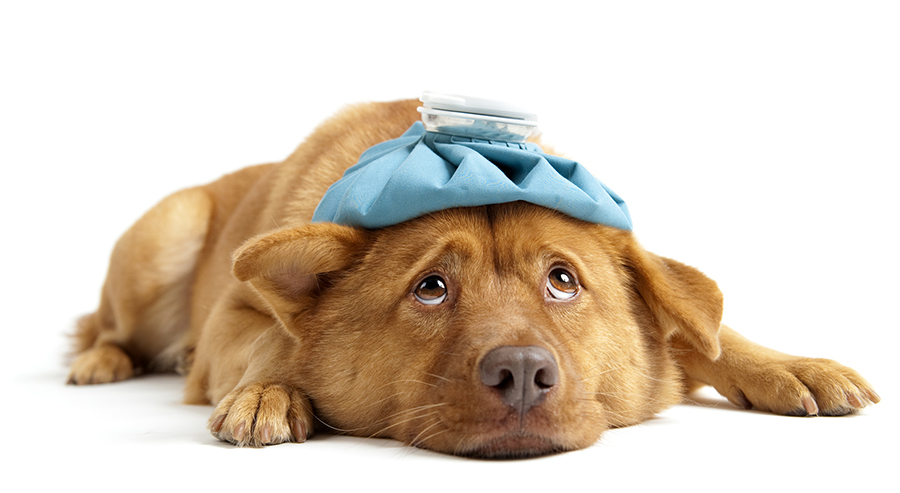Kennel Cough (Canine Cough)
'Kennel Cough' is one of the most common conditions of the upper respiratory tract in dogs. The condition is also known as tracheobronchitis, canine infectious tracheobronchitis, Canine Cough and Bordetellosis. The disease is found worldwide and will infect a very high percentage of dogs in their lifetime. Despite its name “Kennel cough”, it does not require your dog to stay in a kennel to contract it. It is highly contagious and can be transmitted by nose to nose contact with an infected dog or by sharing food and water bowls.
Infectious agents
There are many different agents that can cause Canine Cough. The two most common are Parainfluenza virus and Bordetella bronchiseptica bacteria. Mycoplasma, Canine adenovirus, Reovirus, and Canine Herpes virus are other less common agents that are thought to possibly contribute to the disease.
Parainfluenza virus is the most common viral agent in Canine Cough. This virus causes mild symptoms, which generally last around 5-7 days unless there is secondary involvement with other bacteria (which is usually the case). Both our C5 vaccine and Canine cough vaccines offer some protection against this virus.
Bordetella bronchiseptica is the most common bacterial agent in Canine Cough. Symptoms occur around 3-5 days after exposure, and if uncomplicated with other agents, will last around 10 days. However, after signs of the infection have been resolved, the affected animal will continue to shed the bacteria for 6 to 14 weeks and can spread the disease to other susceptible animals during that time. Both our C5 vaccine and Canine cough vaccines offer some protection against these bacteria.
Canine Cough is most commonly a combination of Parainfluenza and Bordetella and symptoms of this duo last from 14-20 days.
Symptoms
The most common symptom is a dry hacking cough sometimes followed by retching. The cough can be so severe, that it often sounds as if the dog is choking! A watery nasal discharge may also be present. With mild cases, dogs continue to eat and be alert and active. Many times, there is a recent history of boarding or coming in contact with other dogs (including dog training classes). In more severe cases, the symptoms can include lethargy, fever, inappetence, pneumonia, and in very severe cases, occasionally death. The majority of severe cases occur in immuno-compromised animals (e.g. animals on chemotherapy), or young unvaccinated puppies.
Diagnosis
Your veterinarian can typically diagnose kennel cough from a physical exam and history of recent exposure to other dogs. The cough is very characteristic and can be easily elicited by massaging the dog's larynx or trachea. However if your dog is showing more severe signs of illness, your veterinarian may want to perform diagnostic tests such as a complete blood count (CBC) chest x-ray, and laboratory analysis of the micro-organisms inhabiting your dog's airways. These tests can help determine whether the dog has developed pneumonia or another more serious illness.
Treatment
Because the majority of cases involve a bacterial component, antibiotics are often recommended. We will generally use a broad spectrum antibiotic that will cover for both Bordetella and Mycoplasmas. We will also often prescribe a course of anti-inflammatories to help with mild pain and inflammation of the throat. This can also help reduce fever.
In more severe cases where the animal is not eating, running a high fever, or showing symptoms suggestive of pneumonia, stronger antibiotics are used and we may recommend your animal to be hospitalised for intravenous fluid therapy and other treatments.
Vaccination can provide protection against contracting the disease, however because there are so many different agents that can cause Canine Cough they do don’t offer full protection. They will however help reduce the severity of the disease if the animal becomes infected. After initial vaccination as puppies at 12 and 16 weeks, a yearly booster is recommended. However, some dogs that are at very high risk are vaccinated every six months.
In kennels where Canine Cough is a problem, strict hygiene with thorough cleaning and disinfection of cages and food and water containers is essential. In addition, kennels that are indoors should have good ventilation with an air turnover rate of at least 12 times an hour. Agents causing Canine Cough can be transmitted on hands and clothing as well as through the air, so infected animals must be isolated and handlers should wear gloves and use proper hand washing to help prevent spread. Vaccination of all animals, especially puppies is indicated in problem kennels.




